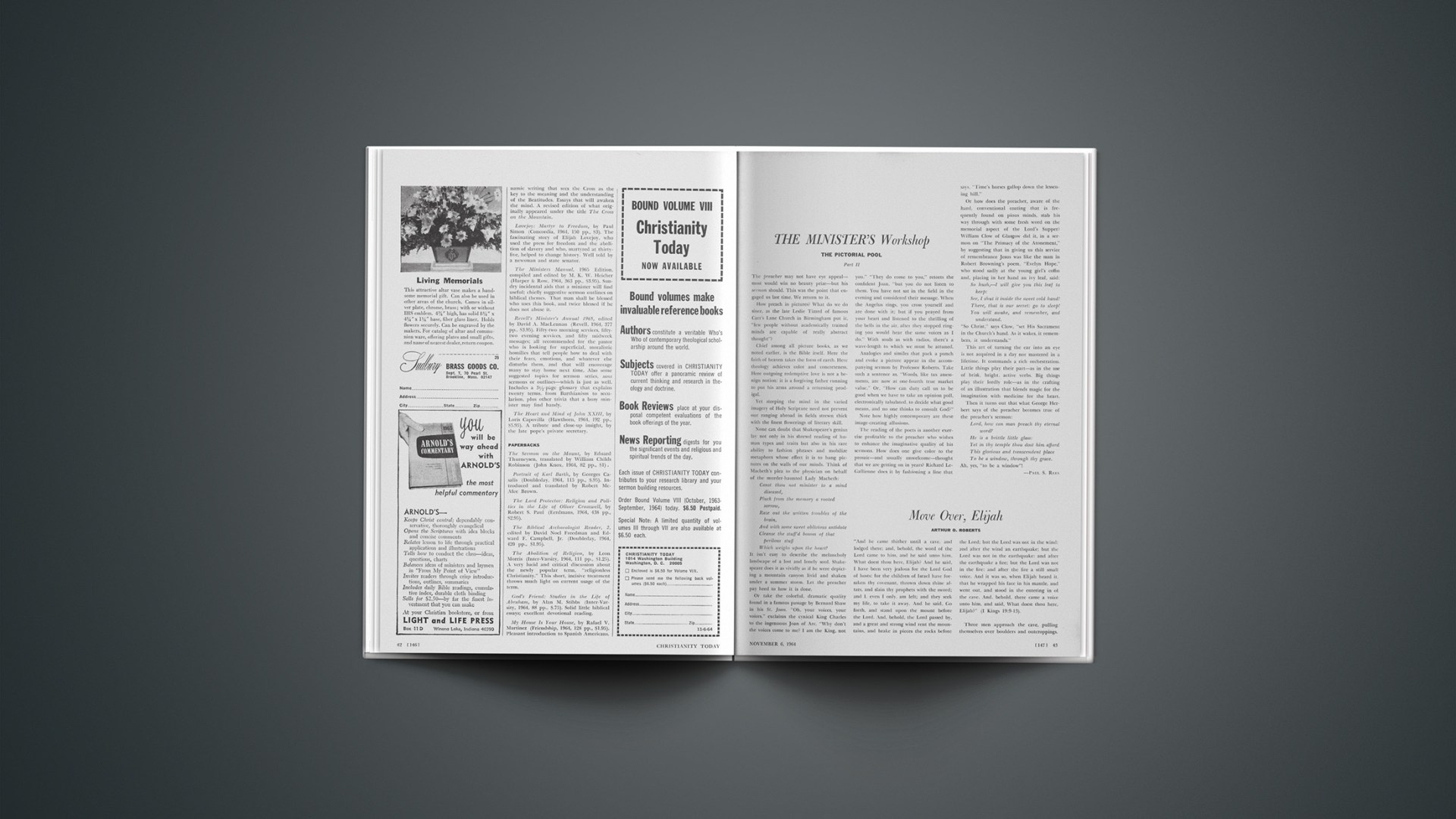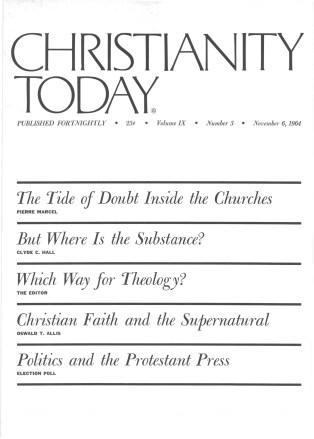THE PICTORIAL POOL
Part II
The preacher may not have eye appeal—most would win no beauty prize—but his sermon should. This was the point that engaged us last time. We return to it.
How preach in pictures? What do we do since, as the late Leslie Tizard of famous Carr’s Lane Church in Birmingham put it, “few people without academically trained minds are capable of really abstract thought”?
Chief among all picture books, as we noted earlier, is the Bible itself. Here the faith of heaven takes the form of earth. Here theology achieves color and concreteness. Here outgoing redemptive love is not a benign notion: it is a forgiving father running to put his arms around a returning prodigal.
Yet steeping the mind in the varied imagery of Holy Scripture need not prevent our ranging abroad in fields strewn thick with the finest flowerings of literary skill.
None can doubt that Shakespeare’s genius lay not only in his shrewd reading of human types and traits but also in his rare ability to fashion phrases and mobilize metaphors whose effect it is to hang pictures on the walls of our minds. Think of Macbeth’s plea to the physician on behalf of the murder-haunted Lady Macbeth:
Canst thou not minister to a mind diseased,
Pluck from the memory a rooted sorrow,
Raze out the written troubles of the brain,
And with some sweet oblivious antidote
Cleanse the stuff’d bosom of that perilous stuff
Which weighs upon the heart?
It isn’t easy to describe the melancholy landscape of a lost and lonely soul. Shakespeare does it as vividly as if he were depicting a mountain canyon livid and shaken under a summer storm. Let the preacher pay heed to how it is done.
Or take the colorful, dramatic quality found in a famous passage by Bernard Shaw in his St. Joan. “Oh, your voices, your voices,” exclaims the cynical King Charles to the ingenuous Joan of Arc. “Why don’t the voices come to me? I am the King, not you.” “They do come to you,” retorts the confident Joan, “but you do not listen to them. You have not sat in the field in the evening and considered their message. When the Angelus rings, you cross yourself and are done with it; but if you prayed from your heart and listened to the thrilling of the bells in the air, after they stopped ringing you would hear the same voices as I do.” With souls as with radios, there’s a wave-length to which we must be attuned.
Analogies and similes that pack a punch and evoke a picture appear in the accompanying sermon by Professor Roberts. Take such a sentence as, “Words, like tax assessments, are now at one-fourth true market value.” Or, “How can duty call us to be good when we have to take an opinion poll, electronically tabulated, to decide what good means, and no one thinks to consult God?”
Note how highly contemporary are these image-creating allusions.
The reading of the poets is another exercise profitable to the preacher who wishes to enhance the imaginative quality of his sermons. How does one give color to the prosaic—and usually unwelcome—thought that we are getting on in years? Richard Le-Gallienne does it by fashioning a line that says, “Time’s horses gallop down the lessening hill.”
Or how does the preacher, aware of the hard, conventional coating that is frequently found on pious minds, stab his way through with some fresh word on the memorial aspect of the Lord’s Supper? William Clow of Glasgow did it, in a sermon on “The Primacy of the Atonement,” by suggesting that in giving us this service of remembrance Jesus was like the man in Robert Browning’s poem. “Evelyn Hope,” who stood sadly at the young girl’s coffin and, placing in her hand an ivy leaf, said:
So hush,—I will give you this leaf to keep:
See, I shut it inside the sweet cold hand!
There, that is our secret: go to sleep!
You will awake, and remember, and understand.
“So Christ,” says Clow, “set His Sacrament in the Church’s hand. As it wakes, it remembers, it understands.”
This art of turning the ear into an eye is not acquired in a day nor mastered in a lifetime. It commands a rich orchestration. Little things play their part—as in the use of brisk, bright, active verbs. Big things play their lordly role—as in the crafting of an illustration that blends magic for the imagination with medicine for the heart.
Then it turns out that what George Herbert says of the preacher becomes true of the preacher’s sermon:
Lord, how can man preach thy eternal word?
He is a brittle little glass:
Yet in thy temple thou dost him afford
This glorious and transcendent place
To be a window, through thy grace.
Ah, yes, “to be a window”!










